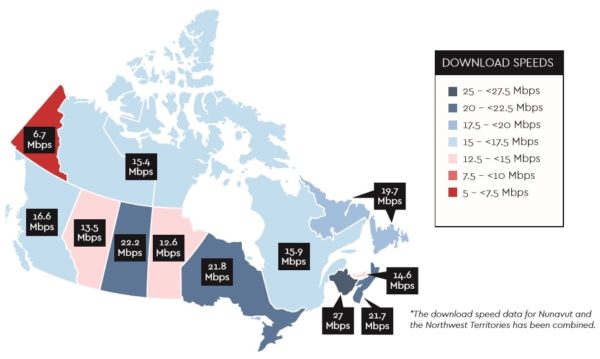
 Alberta, B.C. and the rest of Western Canada are serious laggards when it comes to internet speeds, says a new report.
Alberta, B.C. and the rest of Western Canada are serious laggards when it comes to internet speeds, says a new report.
The study, conducted by the Canadian Internet Registration Authority, collected data from more than 140,000 tests from individual users across the country.
It found the national average download speed to be 18.64 Mbps, but also found that Western Canada in general was pulling down the average considerably. Internet speeds in British Columbia (16.5 Mbps) and Alberta (13.5 Mbps) trailed Quebec (27 Mbps) and Ontario (21.8 Mbps) considerably. Only Saskatchewan’s internet speeds, at 22.2 Mbps stacked up those of provinces Ontario and east.
The list of cities with the fastest internet is dominated by the east, which secured the entire top ten of the list. Toronto took top spot, followed by Ottawa, Montreal, Fredericton, Saint John, Quebec City, London, St. John’s Mississauga, and Brampton.
Regina, Winnipeg, Whitehorse, Surrey, Edmonton, Victoria and Vancouver were at the very bottom of the list.

But if you are in most any Canadian city, the report notes that you will probably enjoy better internet than your country cousin. The average download speed for those in urban areas was 19.8 Mbps, while those in rural areas suffered with juts 14.81 Mbps.
The report, called “Canada’s Internet Performance: National, Provincial and Municipal Analysis April 2016″ was commissioned because CIRA believes fast, reliable and affordable Internet service is critical to economic development.
“What we want to see is a better online Canada. Where Canada not only competes with, but tops the global leaders in access speed, quality, and data sovereignty,” said CIRA CEO Byron Holland. “CIRA launched the Internet performance test and is beginning a series of stories to educate Canadians, policy makers, and organizations on how the Internet really works so they can make informed decisions and improvements.”
The CIRA report notes that Canada ranks 13th out of 92 countries on the Berkman Center for Internet & Society’s Internet Monitor, which measures factors such as speed, price and adoption of broadband internet.
So what can be done to change the east/west imbalance in the country? The CIRA report says it doesn’t know why the disparity exists, but a spokesman says the first step is talking about why there is such a difference in internet speeds across Canada.
“Really what has to happen next year is that the Internet community and stakeholders and individual markets need to look at these results as a call to action, that they can use to help facilitate dialogue and conversation about why their networks are performing the way they are,” says CIRA’s Ryan Hill.
Leave a Reply
You must be logged in to post a comment.



 Share
Share Tweet
Tweet Share
Share




Comment